The intricate interplay between sleep and blood sugar levels highlights the importance of managing sleep habits...
Digital Desk: Many individuals scuffling with high blood sugar levels despite sticking to recommended lifestyle interventions may find a surprising culprit in their battle against diabetes: lack of sleep. Beyond diet, medication, and exercise, sleep plays a crucial yet often overlooked role in glucose regulation. The intricate interplay between sleep and blood sugar levels highlights the importance of managing sleep habits in diabetes management.
Research indicates that inadequate sleep can disrupt the delicate balance of hormones responsible for appetite regulation and metabolism, potentially leading to overeating and subsequent blood sugar spikes. Furthermore, sleep deprivation can hinder the body's ability to utilize insulin efficiently, fostering insulin resistance and exacerbating diabetes symptoms.
Experts sheds light on five key mechanisms through which insufficient sleep can contribute to elevated blood sugar levels:
1. Increased insulin resistance: Sleep deprivation diminishes the body's responsiveness to insulin, hindering glucose uptake by cells and leading to elevated blood sugar levels.
2. Hormonal imbalance: Disrupted sleep patterns can alter levels of cortisol, ghrelin, and leptin, hormones involved in appetite regulation and glucose metabolism, thereby promoting insulin resistance and weight gain.
3. Impaired glucose tolerance: Poor sleep quality can impair the body's ability to process glucose effectively, resulting in elevated blood sugar levels even after consuming carbohydrates.
4. Increased food cravings: Sleep deprivation is associated with heightened cravings for high-calorie, sugary foods, contributing to excessive calorie intake and insulin resistance.
5. Disrupted circadian rhythm: Irregular sleep-wake cycles or shift work can disrupt the body's internal clock, leading to dysregulated blood sugar levels and an increased risk of developing type 2 diabetes over time.
In light of these results, prioritizing adequate and quality sleep should be an integral component of diabetes management strategies. By recognizing the profound impact of sleep on blood sugar regulation, individuals can take proactive steps to optimize their sleep habits, thereby enhancing overall health and well-being in the fight against diabetes.

Leave A Comment